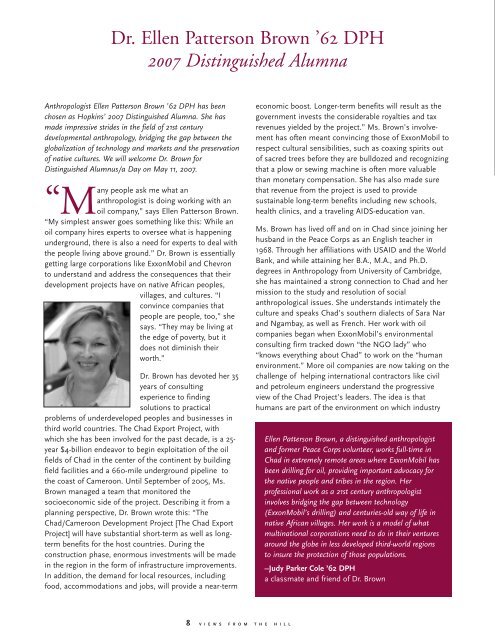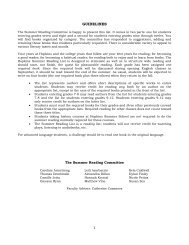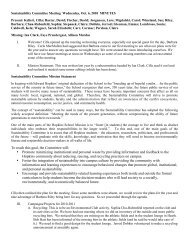For Love of the Game An Appreciation of Tom Parr ... - Hopkins School
For Love of the Game An Appreciation of Tom Parr ... - Hopkins School
For Love of the Game An Appreciation of Tom Parr ... - Hopkins School
Create successful ePaper yourself
Turn your PDF publications into a flip-book with our unique Google optimized e-Paper software.
Dr. Ellen Patterson Brown ’62 DPH<br />
2007 Distinguished Alumna<br />
<strong>An</strong>thropologist Ellen Patterson Brown ’62 DPH has been<br />
chosen as <strong>Hopkins</strong>’ 2007 Distinguished Alumna. She has<br />
made impressive strides in <strong>the</strong> field <strong>of</strong> 21st century<br />
developmental anthropology, bridging <strong>the</strong> gap between <strong>the</strong><br />
globalization <strong>of</strong> technology and markets and <strong>the</strong> preservation<br />
<strong>of</strong> native cultures. We will welcome Dr. Brown for<br />
Distinguished Alumnus/a Day on May 11, 2007.<br />
people ask me what an<br />
anthropologist is doing working with an<br />
“Many<br />
oil company,” says Ellen Patterson Brown.<br />
“My simplest answer goes something like this: While an<br />
oil company hires experts to oversee what is happening<br />
underground, <strong>the</strong>re is also a need for experts to deal with<br />
<strong>the</strong> people living above ground.” Dr. Brown is essentially<br />
getting large corporations like ExxonMobil and Chevron<br />
to understand and address <strong>the</strong> consequences that <strong>the</strong>ir<br />
development projects have on native African peoples,<br />
villages, and cultures. “I<br />
convince companies that<br />
people are people, too,” she<br />
says. “They may be living at<br />
<strong>the</strong> edge <strong>of</strong> poverty, but it<br />
does not diminish <strong>the</strong>ir<br />
worth.”<br />
Dr. Brown has devoted her 35<br />
years <strong>of</strong> consulting<br />
experience to finding<br />
solutions to practical<br />
problems <strong>of</strong> underdeveloped peoples and businesses in<br />
third world countries. The Chad Export Project, with<br />
which she has been involved for <strong>the</strong> past decade, is a 25year<br />
$4-billion endeavor to begin exploitation <strong>of</strong> <strong>the</strong> oil<br />
fields <strong>of</strong> Chad in <strong>the</strong> center <strong>of</strong> <strong>the</strong> continent by building<br />
field facilities and a 660-mile underground pipeline to<br />
<strong>the</strong> coast <strong>of</strong> Cameroon. Until September <strong>of</strong> 2005, Ms.<br />
Brown managed a team that monitored <strong>the</strong><br />
socioeconomic side <strong>of</strong> <strong>the</strong> project. Describing it from a<br />
planning perspective, Dr. Brown wrote this: “The<br />
Chad/Cameroon Development Project [The Chad Export<br />
Project] will have substantial short-term as well as longterm<br />
benefits for <strong>the</strong> host countries. During <strong>the</strong><br />
construction phase, enormous investments will be made<br />
in <strong>the</strong> region in <strong>the</strong> form <strong>of</strong> infrastructure improvements.<br />
In addition, <strong>the</strong> demand for local resources, including<br />
food, accommodations and jobs, will provide a near-term<br />
8 V I E W S F R O M T H E H I L L<br />
economic boost. Longer-term benefits will result as <strong>the</strong><br />
government invests <strong>the</strong> considerable royalties and tax<br />
revenues yielded by <strong>the</strong> project.” Ms. Brown’s involvement<br />
has <strong>of</strong>ten meant convincing those <strong>of</strong> ExxonMobil to<br />
respect cultural sensibilities, such as coaxing spirits out<br />
<strong>of</strong> sacred trees before <strong>the</strong>y are bulldozed and recognizing<br />
that a plow or sewing machine is <strong>of</strong>ten more valuable<br />
than monetary compensation. She has also made sure<br />
that revenue from <strong>the</strong> project is used to provide<br />
sustainable long-term benefits including new schools,<br />
health clinics, and a traveling AIDS-education van.<br />
Ms. Brown has lived <strong>of</strong>f and on in Chad since joining her<br />
husband in <strong>the</strong> Peace Corps as an English teacher in<br />
1968. Through her affiliations with USAID and <strong>the</strong> World<br />
Bank, and while attaining her B.A., M.A., and Ph.D.<br />
degrees in <strong>An</strong>thropology from University <strong>of</strong> Cambridge,<br />
she has maintained a strong connection to Chad and her<br />
mission to <strong>the</strong> study and resolution <strong>of</strong> social<br />
anthropological issues. She understands intimately <strong>the</strong><br />
culture and speaks Chad’s sou<strong>the</strong>rn dialects <strong>of</strong> Sara Nar<br />
and Ngambay, as well as French. Her work with oil<br />
companies began when ExxonMobil’s environmental<br />
consulting firm tracked down “<strong>the</strong> NGO lady” who<br />
“knows everything about Chad” to work on <strong>the</strong> “human<br />
environment.” More oil companies are now taking on <strong>the</strong><br />
challenge <strong>of</strong> helping international contractors like civil<br />
and petroleum engineers understand <strong>the</strong> progressive<br />
view <strong>of</strong> <strong>the</strong> Chad Project’s leaders. The idea is that<br />
humans are part <strong>of</strong> <strong>the</strong> environment on which industry<br />
Ellen Patterson Brown, a distinguished anthropologist<br />
and former Peace Corps volunteer, works full-time in<br />
Chad in extremely remote areas where ExxonMobil has<br />
been drilling for oil, providing important advocacy for<br />
<strong>the</strong> native people and tribes in <strong>the</strong> region. Her<br />
pr<strong>of</strong>essional work as a 21st century anthropologist<br />
involves bridging <strong>the</strong> gap between technology<br />
(ExxonMobil’s drilling) and centuries-old way <strong>of</strong> life in<br />
native African villages. Her work is a model <strong>of</strong> what<br />
multinational corporations need to do in <strong>the</strong>ir ventures<br />
around <strong>the</strong> globe in less developed third-world regions<br />
to insure <strong>the</strong> protection <strong>of</strong> those populations.<br />
–Judy Parker Cole ’62 DPH<br />
a classmate and friend <strong>of</strong> Dr. Brown





